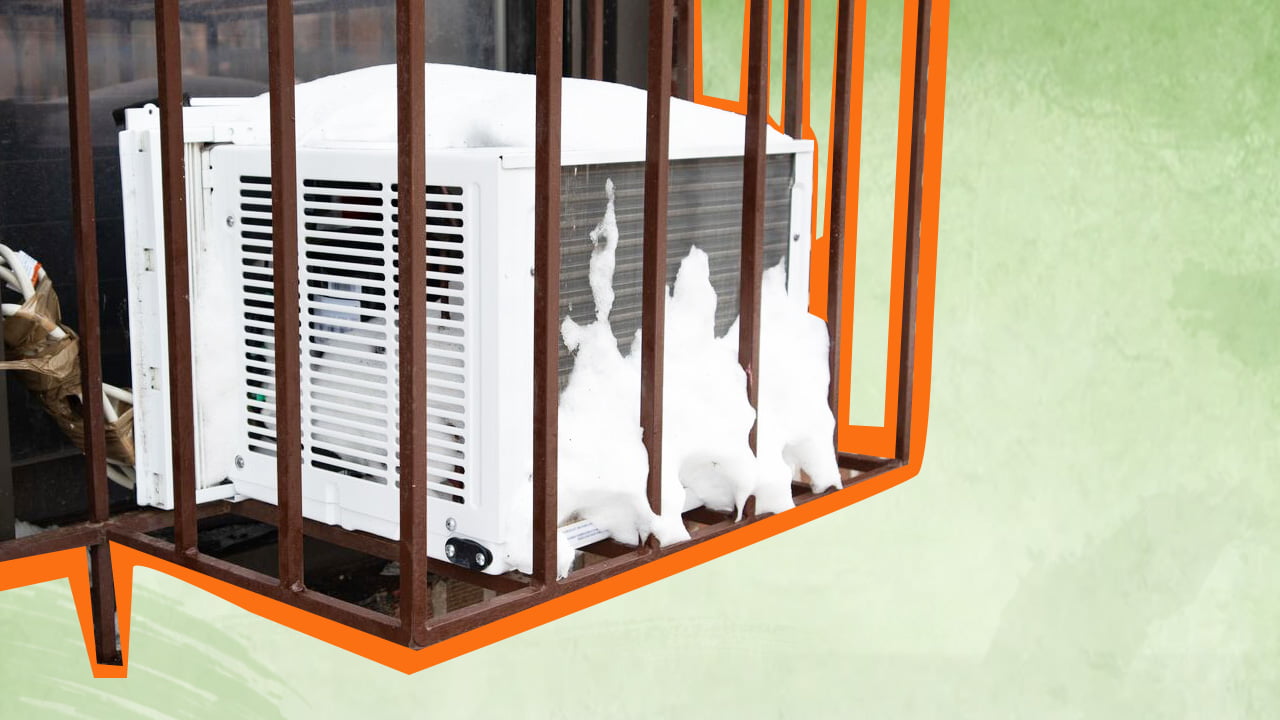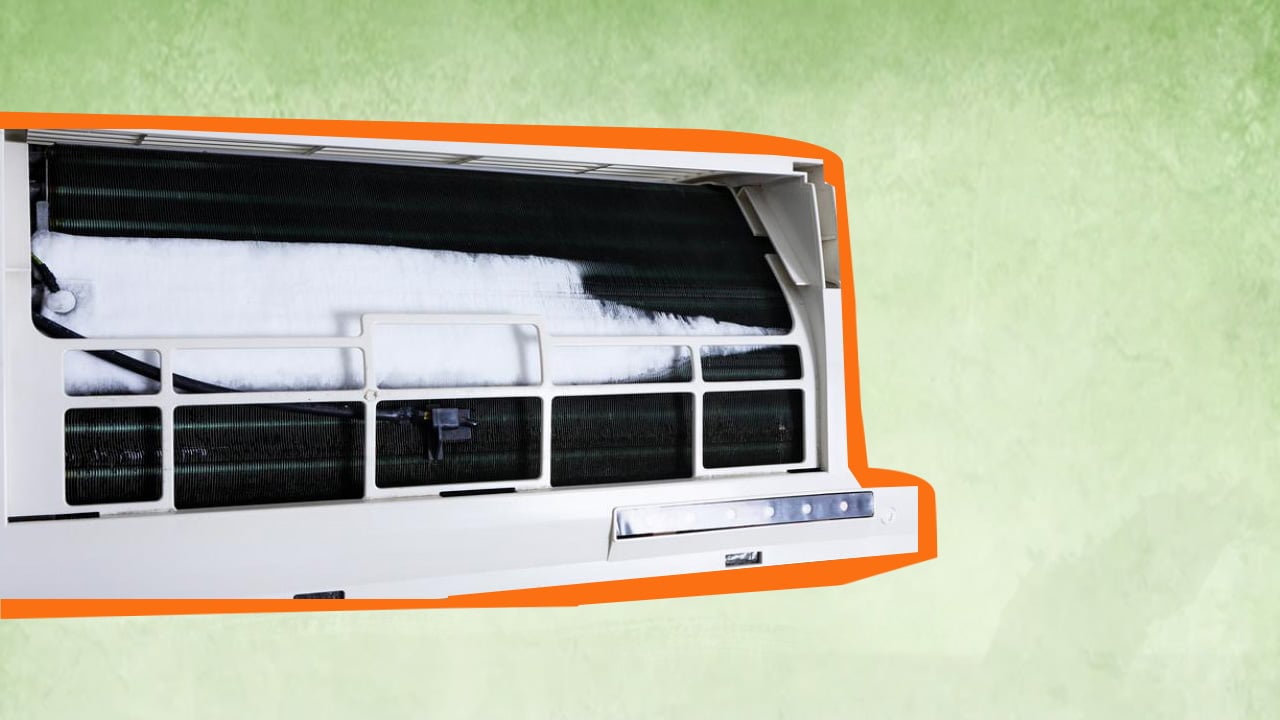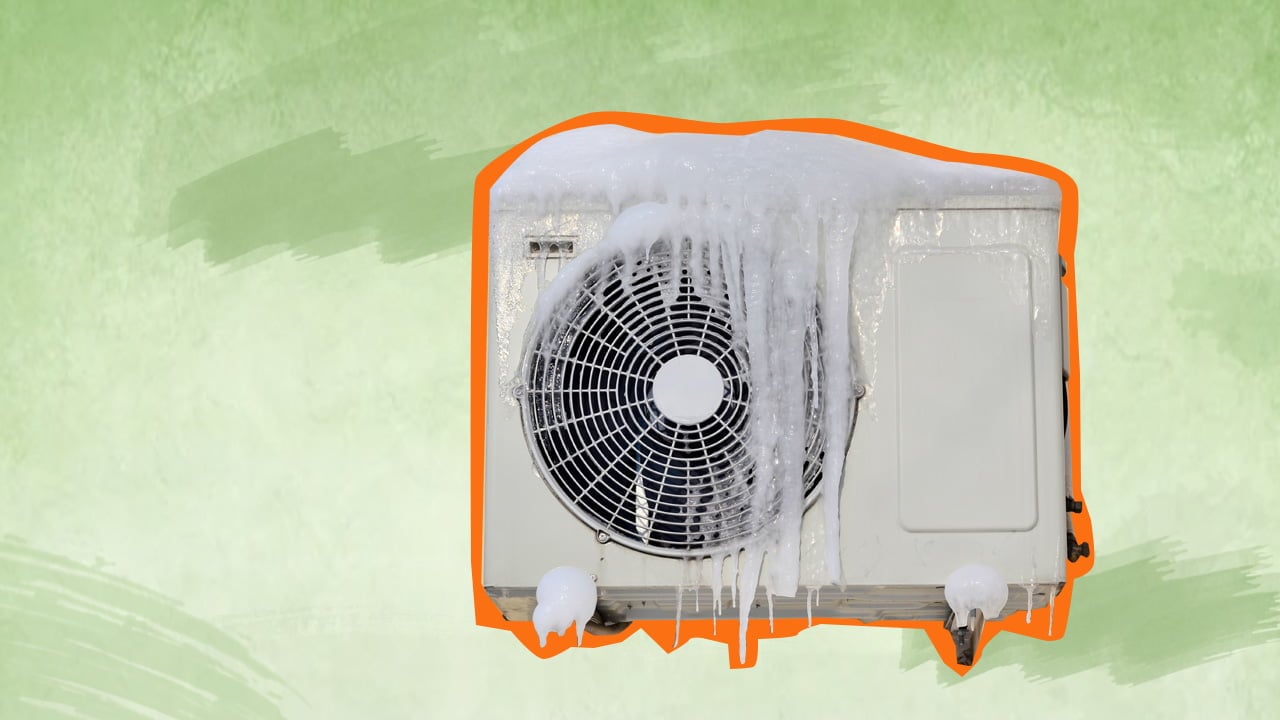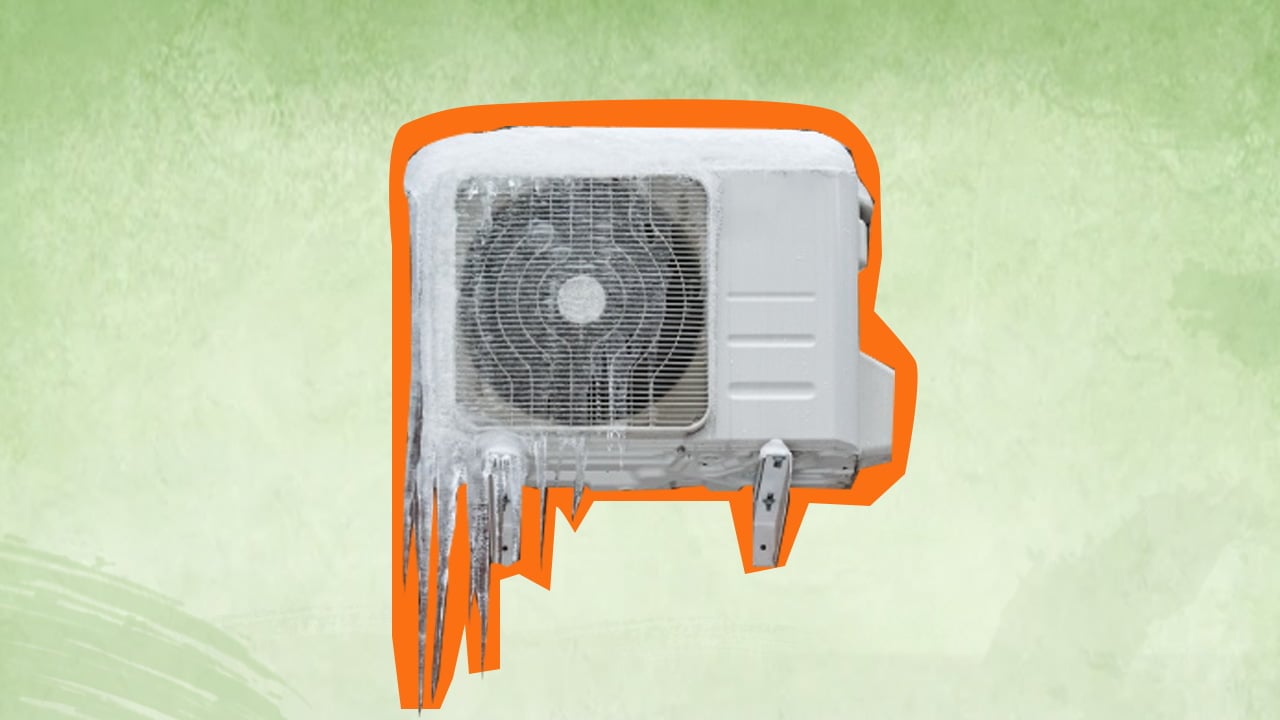Window air conditioners can freeze up due to various underlying issues, including low refrigerant levels, dirty filters, broken internal parts, etc. Solving these HVAC malfunctions and taking a few precautionary measures can prevent the AC unit from freezing.

A window air conditioner unit should never be frozen even if the outside temperature drops very low.
This is because such a condition does not go away on its own; rather, it requires a proper solution. Moreover, the entire AC unit doesn’t freeze up; the indoor evaporator coils usually develop tiny ice particles, which, in turn, affects the unit’s performance.
The evaporator coils in window air conditioners are located in the forefront of the unit, which remains within the room. It is fixed behind the air filter, which needs to be removed to address the freezing issues of the AC unit.
However, if you don’t get it fixed and continue to operate it while frozen, your window AC unit will be permanently damaged. So, to equip you with the right knowledge and solutions regarding a frozen window AC, I have explained the causes and repair techniques in great detail.
Can Window AC Units Function Properly While Frozen?

Window air conditioners draw in warm air with the help of their fan motor to the rear end of the AC unit during normal operation. This warm air then passes through the cold evaporator coils, where the heat from the air is transmitted to the refrigerant (Freon or otherwise), which is then expelled outside through the condenser. On the other hand, the cool air produced in the coils is recirculated into the room to achieve the correct temperature.
During the entire process, moisture forms on each evaporator fin, which eventually drips into a pan or tank at the bottom of the window AC unit. This moisture further runs through installed channels to fall to the ground below.
Sometimes, under abnormal circumstances, the cold moisture-laden gas from the AC unit freezes before it can drip off in liquid form. This way, the evaporator coils gradually freeze over, making it difficult for the entire unit to maintain proper airflow.
So, even though a window AC unit can run for some time while frozen, it will eventually stop blowing air back into your room effectively.
Causes of Window Air Conditioner Freezing Up
1. Dirty Air Filter
Clogged and dirty air filters are the most common reasons why window air conditioners freeze - this results in poor airflow, which prevents the condenser from expelling moisture properly. Many things can attach to the air filter, including dust, dirt, pet hair, grease, etc., so it requires a thorough cleaning at least once a month.
Tip
If you find the window AC freezing, quickly remove the air filter and check if it is dirty. If you want to double-check, simply set your window AC on the highest cooling setting, and see if you can hear the compressor kick in and the room air cools down fast enough.
Clean the air filter using warm water and soap, or follow the manufacturer’s instructions that you can find in the AC manual.
2. Low Refrigerant Level
If you clean the air filter regularly and your window AC unit is in good condition but still not cooling properly, there might be a problem with the refrigerant inside.
The refrigerant in window air conditioners flows inside a closed system and is typically sufficient for the entire longevity of the unit. So, suppose a leak has caused a low refrigerant level in the AC. In that case, it’s highly likely that the liquid is flowing away due to leaks - and these leaks prevent the window air conditioner from functioning properly and restrict airflow.
If you have a refrigerant leak, I suggest calling a licensed HVAC technician to fix the issue since handling the refrigerant can be harmful and is banned in many states. However, if the refrigerant leak is due to your AC unit aging, consider replacing the unit altogether. This can save energy bills, especially if your window AC is over ten years old.
3. Poor Air Flow
Besides dirty filters, dirt accumulation in other mechanical parts of the AC unit can lower airflow and make your window AC freeze up. Evaporator and condenser coil fins help an air conditioner to circulate air through the front grille and backside. These fins are very small and tightly spaced, so they get easily clogged with debris and pet hair, lowering airflow to the unit.
If you find the AC coils clogged, it’s best to start cleaning them and check if that’s causing the window air conditioners to freeze. Use a soft rag or brush, and be mindful while cleaning them to avoid bending or flattening them.
Tip
I recommend using a paintbrush with soft bristles (about half to one inch wide) to clean the coil fins.
4. Thermostat Issues
Often, window AC freezing can be caused by faulty thermostat settings. For example, if the thermostat is set too low, the window AC unit will run for too long, making the temperature of the condenser drop below the freezing point. This can also happen when you leave the air conditioner working all night unnecessarily. Doing so will not only lead to your air conditioner freezing, but it also wastes a lot of energy.
Always keep an eye on the thermostat and resolve any issues related to it.
5. Broken Or Loose Fan
If the blower fan motor is making a squealing or rattling noise, your air conditioner is probably freezing up because of this. The blower fan keeps the cool and hot air moving in the system, so if the turbine blades are broken, the AC unit will not work properly. In this case, you must replace the broken fan with a new one to prevent ice formation.
However, if the fan has come loose, the problem can be easily resolved by tightening the screws on the collar of the blower fan. And while you’re at it, check for dirt and grease buildup on the blades, and clean them if you find any.
6. Defective Mechanical Parts
Typically, window AC units can last up to 12 years if properly maintained. However, many internal components can malfunction with age. These include the temperature sensor, run-start capacitor, electronic control board, inductor, etc. If you feel there are some issues regarding these components, it’s best to call a heating, ventilation, and air conditioning technician to resolve them.
7. Running The AC In Cooling Mode During Cold Weather
If you run the window air conditioner in cooling mode while the outdoor temperature falls below 60 degrees Fahrenheit, it’s no surprise if the unit starts freezing. This is because the refrigerant won’t find much heat to extract from the indoor air when the temperature is already too low.
Of course, running the window AC in heating mode during cold weather won’t result in freezing.
Signs of a Frozen Window Air Conditioner
1. Ice Buildup on the Unit
The easiest way to determine if your window AC unit is freezing is to check for any visible ice buildup on its body. Usually, clear or white ice forms on the part of the unit that remains outside. However, you’ll often find dirty, brown ice forming on the indoor cold coils. Regardless of where you see the ice forming, you should quickly address the issue before it incurs severe damage.
2. Decreased Cooling Effectiveness
Of course, a frozen window AC with lower airflow and malfunctioning evaporator coils will not work as effectively as it does under normal circumstances. If you suddenly notice the AC unit unable to lower the temperature or humidity in the room even if it works for a long time, this could be a big sign of the AC freezing.
3. Water Leakage
When there’s ice buildup on the air conditioner, it will obviously leak some water due to temperature fluctuations. So, if you find water leaking from the AC unit, there can be two issues: either the drip pan is broken, or the unit is freezing up.

How To Fix A Frozen Window Air Conditioner
A frozen window air conditioner wouldn’t fix itself on its own, nor will it function properly, so you must take immediate action after diagnosis. Here are some steps you can follow:
1. Turn Off The Unit
Switching off the air conditioner when it’s frozen is the safest way to prevent any short-circuit or accidents that can harm you while you’re troubleshooting. It also helps take a huge load off your compressor and prevents it from getting damaged.
2. Clean Or Replace The Air Filter
As I already mentioned before, dirty filters are a major concern. This problem is often fixed by simply taking out the air filter and thoroughly cleaning it to help with proper airflow.
3. Wait For The Ice To Melt
Before trying to take your AC apart to see what’s wrong, uninstall the unit from the window and keep it in a warm area for the ice to melt. You can check for any blockages in the condensate pan or tank if the ice takes too long to melt.
4. Place The Unit At A Certain Angle
To ensure the melted ice is drained properly, keep the window air conditioner sitting with a slight backward tilt to help the water flow out easily. When fully melted, check if the AC unit works properly and install it back into the window.
5. Use Other Methods To Melt Ice Faster
Another way you can melt the ice faster is by using a hair dryer to apply heat onto the evaporator coil. Alternatively, you can turn on the AC fan and increase the fan speed to help warm indoor airflow through the unit and melt the ice. However, you must ensure that you don’t turn on the compressor by mistake.
6. Check The Thermostat And Other Underlying Issues
When the ice on the AC unit fully melts, check if the thermostat is set at the correct temperature and setting. Another thing that’ll help improve airflow is increasing the fan speed and keeping the supply vents open, even when the unit is not set on the cooling mode.
Prevention Tips
Window air conditioners don’t commonly freeze up So, taking a few precautions and ensuring the AC unit is in the proper conditioner will go a long way in preventing this issue. Here are a few things you should keep in mind.
1. Regular Maintenance
Don’t just wait for your air conditioner to start malfunctioning to call an HVAC professional. Rather, get it checked frequently to avoid damage. This is especially true if you use the window AC regularly for a prolonged time since the chances of the evaporator coil freezing is significantly higher in this case.
If you start using the window AC in spring, I recommend getting it professionally cleaned and checked by a licensed technician.
2. Keep The Air Filter Clean
Cleaning or replacing the dirty air filter falls within the scope of AC maintenance. However, it doesn’t require a technician and can be done at home. Ideally, you should check the grilles and the filter once every month to ensure there’s no debris build-up. During the inspection, if you find even a little dirt, you should immediately clean the dirty filter to avoid severe coagulation that may require professional cleaning.
3. Ensure Proper Airflow
The ultimate solution to an AC unit freezing is ensuring proper airflow, which is also a preventative measure. Check the cold coil, supply vents, front and back grilles, air filter, and condenser coils for any blockages.
You can also help your air conditioner circulate air by keeping the ceiling fan on to spread the cool air evenly.
4. Turn Off The Unit When Not In Use
Turning off your window air conditioner when not in use can save you a lot of money and energy. Moreover, it takes off unnecessary pressure from the evaporator coil and compressor, helping them maintain optimal airflow.
It’s best to turn off the unit immediately after it has reached the desired room temperature - if you want some ventilation, simply turn on the ceiling fan.

To Sum It Up
Your window air conditioner can freeze up for a number of reasons: low outdoor temperature, poor airflow, dirty air filters, thermostat issues, broken internal parts, etc. However, you can tackle the problem by turning off the unit, melting the ice, and checking for any malfunctioning AC parts. And if you still can’t figure out what’s wrong, call a licensed HVAC to help you diagnose the AC unit.
Moreover, regardless of the age of the AC unit or its type, you must follow proper precautionary measures and get frequent maintenance services done. This will not only prevent your air conditioner from freezing but also help tackle other long-term HVAC issues.
That brings me to the end of this article. If you find this informational piece useful, stick around for more such updates. Until then, goodbye!
